When the authorities started to get serious about food safety in China, one suspiciously smelling street food got caught in the crosshairs.
The scent of chou doufu stays with you long after eating it. It lurks in your nostrils, on your hands, in your hair, and on your clothes. When dunked into a deep fryer, releasing the pungent odor of the brine in which it’s fermented, chou doufu (literally “stinky” tofu) has the same bewildering effect as a really smelly blue cheese—it’s mildly off-putting, yet intoxicating.
The ancient city of Shaoxing, about an hour-and-a-half southwest of Shanghai by train, is known in China for a number of things—its literary heritage, its distinctive opera, a system of slender canals to rival Amsterdam’s. It’s also known for its most prized delicacy: stinky tofu.
Though the funky delicacy has been ingrained in the culture of Shaoxing for more than 2,500 years, its future is suddenly uncertain. Stinky tofu, like other street food across China, is caught in the crosshairs as Chinese authorities strengthen the country’s food safety laws. What’s under threat is more than just affordable snacks. It’s also the livelihoods of countless street-food chefs across the country—and an invaluable part of China’s culinary heritage.
The origin of stinky tofu isn’t clear, but according to one story, this predilection for odoriferous foods in Shaoxing is largely thanks to a shameful incident that occurred during the Zhou dynasty from 770 BC to 476 BC. The Yue state (of which modern Shaoxing is now a part) had just lost a war to the neighboring Wu State. The Yue king, Gou Jian, was made a prisoner of the Wu king, Fu Chai, and forced to serve as his slave for years. During this time, Fu Chai became ill and Gou Jian paid him a visit. In an attempt to show his fealty, Gou Jian offered to make a prognosis about Fu Chai’s recovery by examining his stool. Gou Jian was keen to get on his rival’s good side and made a point to taste it, as well. And with that, he proclaimed the king would recover soon.
Suitably impressed, Fu Chai granted Gou Jian his freedom at once. But when the people of Yue learned of this disgrace, they were mortified. According to the legend, they decided to mark their humiliation by eating similarly odorous foods, and the region developed a distinct cuisine based around smelly, fermented dishes, including chou doufu.
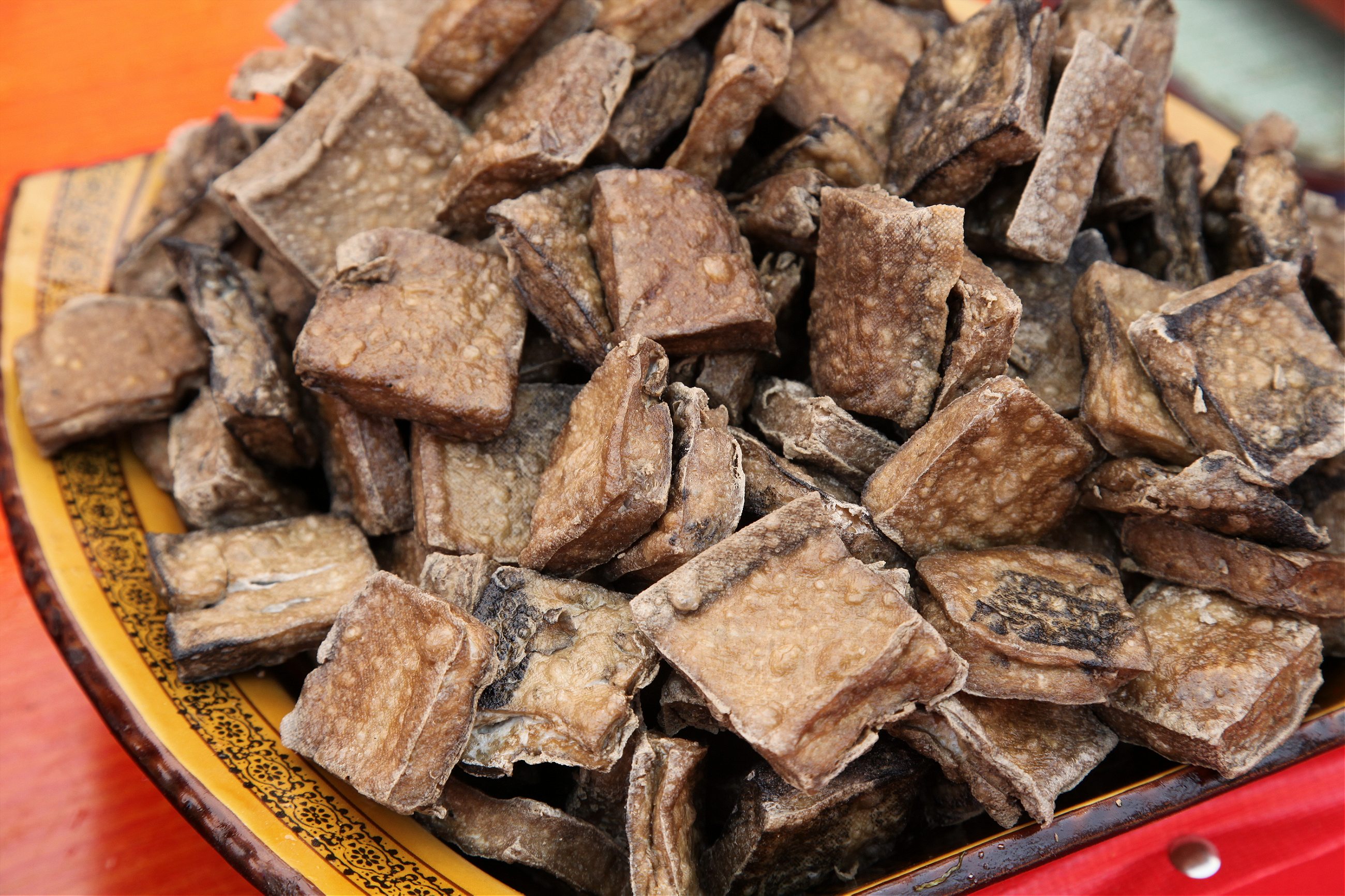
Springtime is when amaranth shoots begin to jut from the soil across China. Prized by the Mayan and Aztec civilizations, the bushy-looking plant with a dramatic red plume of flowers has also long been a feature of many Asian cuisines. The purple-streaked leaves of the plant are used mostly in stir-fry dishes and soups in China, but in Shaoxing, amaranth stalks have also traditionally been fermented and then steamed to make a dish called mei xian cai gen. Food writer Fuchsia Dunlop has described the taste of fermented amaranth stalks as “putrescent and wildly exciting at the same time,” and the brine that’s left over after the fermentation process as smelling little better than a “drain blocked by rotten vegetation.”
Revolting enough, in other words, for another important use: to give stinky tofu its legendary scent.
Even though stinky tofu is beloved, it has quite a notorious reputation in China. There have been sordid reports in the press about illegal tofu workshops using industrial chemicals to give a certain kind of stinky tofu eaten in Hunan province its traditional black color and others adding revolting things such as dead snails and rancid meat to their brine to cut corners—and make their product even stinkier.
Going back to the legend of Gou Jian, excrement was allegedly discovered at one of these so-called “black workshops,” too. In 2003, an intrepid reporter for Shenzhen News, an online news outlet in the southern city of Shenzhen, went undercover at a workshop and was allegedly told by a particularly callous boss, “If the stinky tofu isn’t stinky enough, we put a little feces water in it.” Whether true or not, the report sent shockwaves through the country, and the authorities were quick to shut the workshop down.
Years later, in the steamy port city of Wenzhou, another scandal went viral, further diminishing the delicacy’s good name. A man identified only as Mr. Su had become critically ill after eating a plate of chou doufu he bought on the street. After experiencing symptoms resembling food poisoning, Su’s organs mysteriously shut down and he slipped into a coma. Miraculously, he survived the ordeal and woke up a week later to a hefty hospital bill and nationwide notoriety. The most shocking claim came from a news report saying doctors “speculated” Su’s illness had been caused by tofu fermented in human feces. Local health experts later discounted the report, but when it comes to stinky tofu, stories like this refuse to die in China.
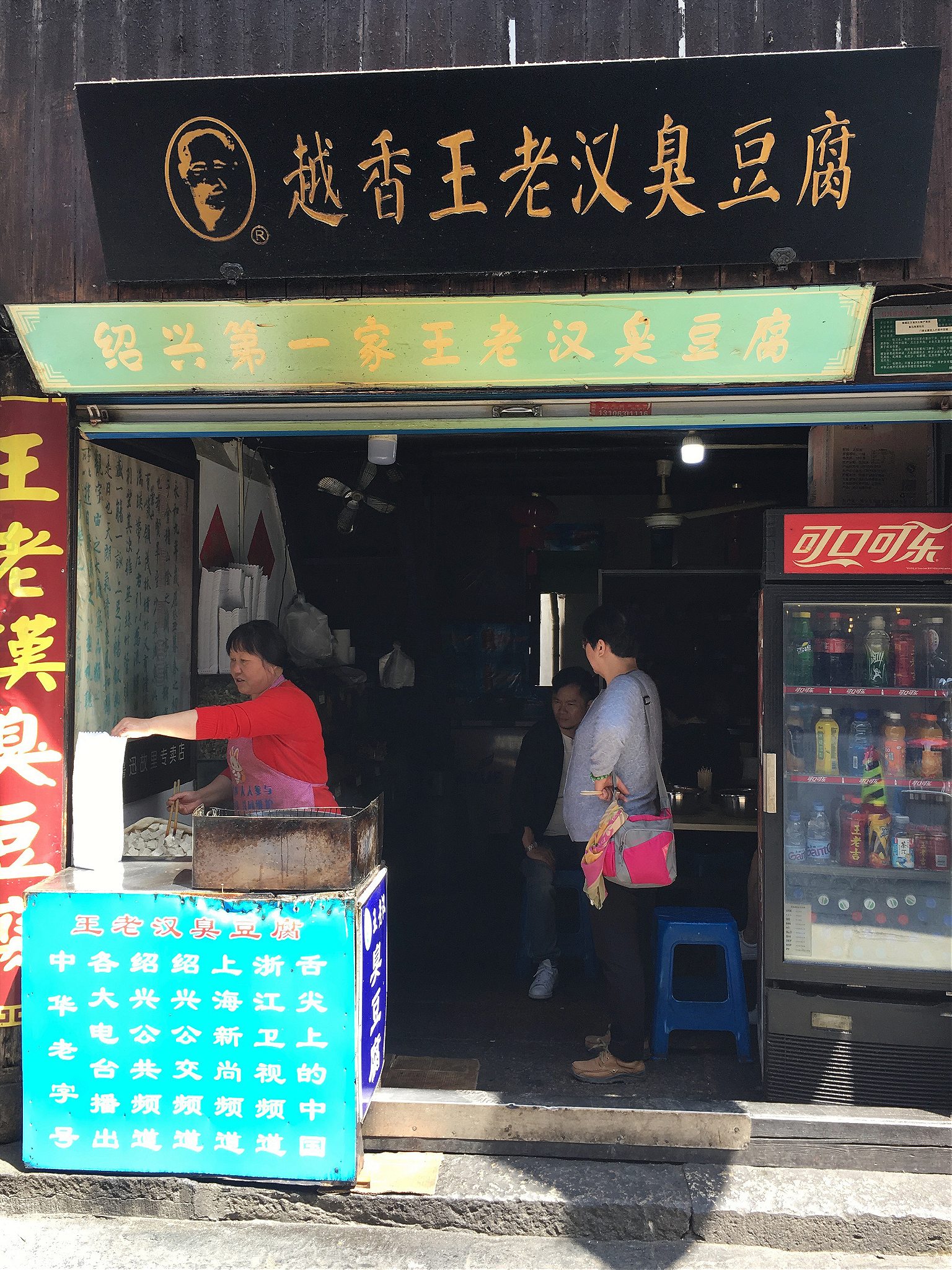
For stinky tofu vendors like Zhao Baoxian, this is problematic. Zhao, a kind, grandfatherly man who has a small scar above his lip that curls when he smiles, runs a massively popular tofu stall called “The Most Fragrant Old Man Wang’s Stinky Tofu” in the historic heart of Shaoxing. It comes highly recommended by diners on Dianping, the Chinese version of Yelp! “This is the best stinky tofu I ever had! Nothing else comes close to it,” one reviewer gushed. But just as Zhao’s business was taking off several years ago, his life was turned upside down. A new national food safety law came into effect in 2015, and a noose began tightening on street-food vendors like him across the country.
When I arrived at Zhao’s stall, the smell of frying chou doufu hit me in the face like a backed-up sewer. Zhao’s wife, Chen Caijuan, was cooking out front in a smudged pink apron, wielding oversized wooden chopsticks that looked more like drumsticks. As the oil in her wok bubbled and hissed, she plucked cubes of white tofu cubes from a basket and dunked each into the raging liquid, giving it a quick stir so the pieces wouldn’t cling together.
I noticed tiny brown scars lining her hands and arms—an occupational hazard, evidently. Chen smiled broadly and motioned for me to go inside the small restaurant, which was little more than two tables with blue plastic stools, a refrigerator, and a tiny kitchen no bigger than a closet. Oddly enough, there was also a large portrait of Joseph Stalin on the wall, gazing out imperiously at the brand new Starbucks across the street. It seemed an unlucky spot for his business—a tiny stinky tofu stall having to compete with a global coffee goliath—but Zhao said the opposite was true. The two were actually quite complementary.
“When the Starbucks first opened, people would take their stinky tofu inside to eat. They say ‘Starbucks goes well with stinky tofu,’” he explained. “After a while, more and more people started to bring stinky tofu into Starbucks. And Starbucks started to stink. That was when the staff banned it from the shop.”
Starbucks goes well with stinky tofu
The Starbucks was also a sign of better days for Shaoxing. More tourists meant more people wanting to try Zhao’s chou doufu. His business had not been as brisk when he joined his brother-in-law in the venture in 2005. His brother-in-law—known as “Old Man Wang,” hence the name of the stall—had a hard upbringing. His parents had drowned in a river accident when he was young, and he started making stinky tofu to support himself when he was 16, using a family recipe dating back more than a century to the Qing dynasty. Old Man Wang had made ends meet for years, but business didn’t start to really pick up until tourists trickled into Shaoxing in the mid-2000s. And the brothers had a literary figure to thank for that: Lu Xun, a Shaoxing native widely regarded as China’s best writer of the 20th century.
In recent years, Shaoxing’s old city has become a mini-Disneyland devoted to his life: Hordes of tourists descend on weekends to stroll down Lu Xun Middle Road and tour the ancestral home of Lu Xun’s family, the garden where Lu Xun played as a child and the school where Lu Xun studied. Against this backdrop, Zhao and his brother-in-law eventually built a thriving business fermenting tofu for big hotels and restaurants, while also frying up their own in their tiny stall. Their brand became so well-respected, they were featured on “A Bite of China,” a popular food TV series, gaining nationwide attention.
Zhao and Old Man Wang used to have a license for their business, but it expired about a decade ago and due to changes in the national food regulations, had become extremely difficult to renew. Because they bought tofu from another supplier and only did the fermentation process in their workshop, he didn’t think they needed a food production license. The cost was more than RMB 1 million (about $148,000) and required a facility equipped to properly test the chemicals in the tofu to ensure it’s being made safely. Zhao’s workshop was tiny by comparison. And as long as he followed the proper sanitation guidelines for fermentation, he’d never had any problems.
That is, until one morning in March 2016, at precisely 7 a.m. when the local food inspection agency paid him a visit and demanded to see Zhao’s license. When he couldn’t produce one, he was fined the equivalent of $63,000—five times his profits over a two-year period. It was well beyond what Zhao, who makes about RMB 1,000, or $145—on a good day—could afford to pay.
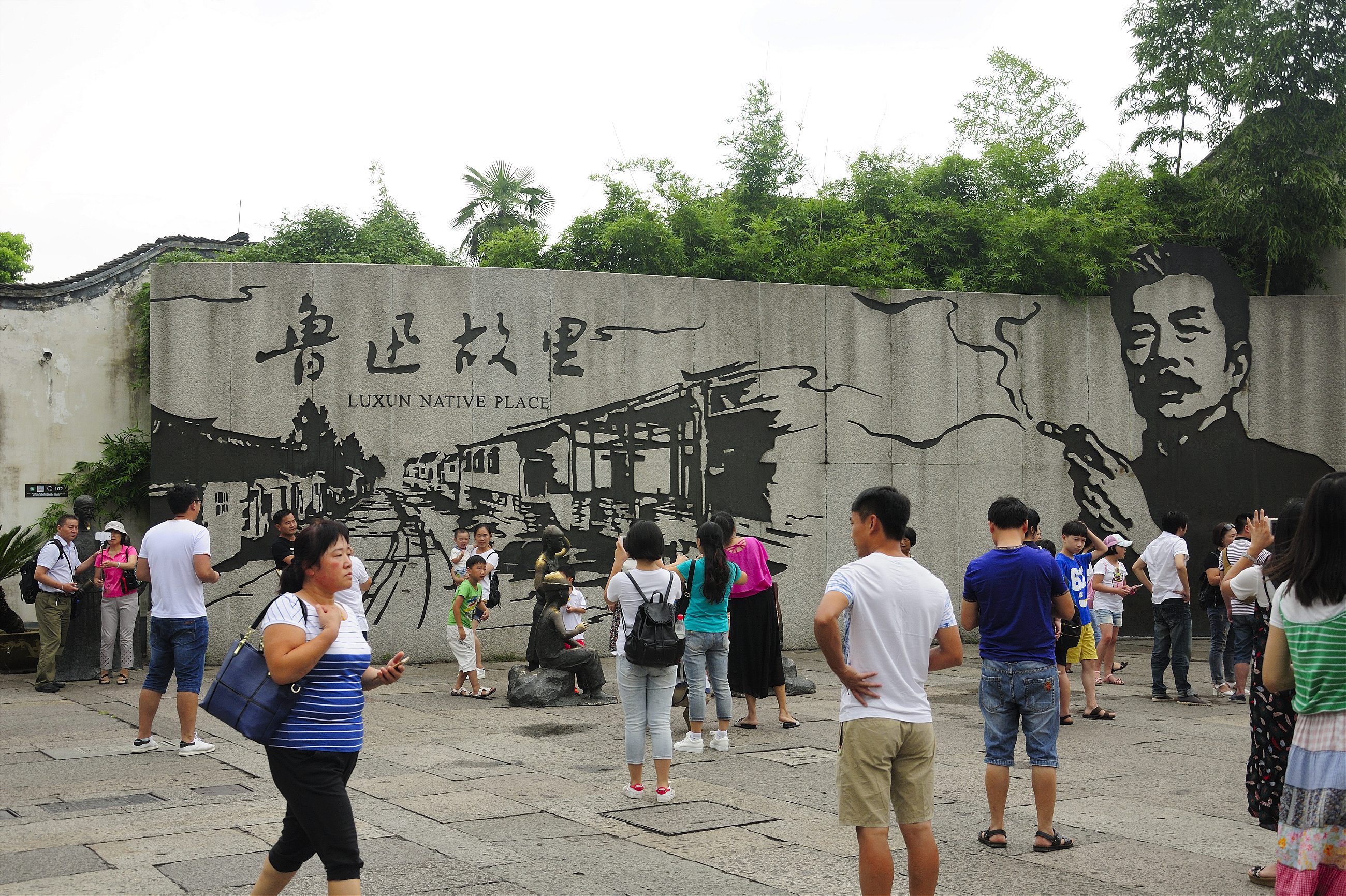
Food safety has long been a concern in China, but it wasn’t until the melamine milk scandal in 2008 that it reached a crisis point. Six infants died and 300,000 others were sickened due to powdered milk tainted with melamine, a chemical often found in plastics. That incident created such a panic in China, people began binge-shopping for milk powder in Hong Kong and skyrocketing demand for Australian milk earned it the nickname “white gold.” Public confidence in the food industry has never recovered.
Once the floodgates opened, there seemed to be an unending stream of disturbing news stories about unscrupulous food manufacturers, toxic farms, and dodgy street-food vendors in the Chinese media. Cadmium levels more than 200 times the national health standard were found in rice in Hunan province, then arsenic and lead started showing up in tests, too. Fields of watermelons actually exploded in Jiangsu province after farmers sprayed them with too much growth accelerator. And meat traders in southern China were caught selling hundreds of millions of dollars’ worth of illegally imported beef, chicken, and pork, some of which had been frozen since the 1970s. When it came to street food, nothing did more damage than the “gutter oil” exposés that shook the country several years ago. The headline in this Washington Post story says it all: “You May Never Eat Street Food in China Again After Watching This Video.”
It’s a Sisyphean task trying to say one step ahead of the cheats in a food industry the size of China’s—there are just too many producers in the supply chain and an infinite number of restaurants, casual food spots, and street vendors trying to feed 1.38 billion hungry people. No matter what the government did to crack down on food safety violations, the problem never seemed to get better. In need of a new approach, the government finally came up with one in 2015—a top-down revision of the national Food Safety Law. The revamped law imposed stricter controls over large sectors of the industry—from online shopping platforms to dietary supplements—and, most dramatically, instituted much tougher punishments for violators, including heavy fines, the revocation of business licenses and even jail time. It was considered the toughest food safety law ever enacted in China. Hotlines were also set up to allow people to make complaints about suspicious food suppliers. In Shanghai, rewards of up to RMB 300,000 ($43,500) were offered for tip-offs that turned out to be true. The hotline received nearly 15,000 complaints in March 2017 alone, when the new hygiene rules took effect in the city.
In many places, the new law had immediate and dire consequences for street-food vendors—those on the bottom rung of the ladder without the guanxi (the all-important social networks and relationships that dictate everything in China) to fight back. As bureaucrats in cities from Beijing to Hong Kong began scrubbing their streets of anything that smacked of poor sanitation, vendors suddenly faced tighter restrictions dictating how they did business, from procuring licenses to where they could set up their stalls. The feared urban management officers who keep order on China’s streets, known as the chengguan, also seemed to have free rein to ramp up their aggressive campaigns to shut them down. Stalls making xiao long bao (soup dumplings) began disappearing in Shanghai, while carts selling steamed buns and jianbing (a popular breakfast crepe) were chased out of Beijing’s working-class neighborhoods.
“We’ve seen a drastic reduction of street-food vendors, especially in the last three years,” says Kyle Long, the American co-founder of UnTour Food Tours, a popular street food tour operator in Shanghai, Beijing, and other cities. “Near tourist areas, for sure, it’s completely gone—it’s laughable at this point to even think of finding one.” Some street food vendors still operate in legal gray zones, he says, but they’ve been pushed to the margins. In Beijing, for instance, some set up pushcarts in clusters under bridges, believing there’s safety in numbers. “But when you hand over the money and they’re looking both ways to make sure there’s no one scoping them out,” Long says.
Those who have moved into small storefronts similar to Zhao’s also live in a perpetual state of fear. Many have flown under the radar for years and are suddenly worried about whether they have the proper licenses and are in compliance with the new regulations. Long says one established Sichuan street food chef on his tour abruptly closed up shop in 2017 with no notice because he didn’t have the right license. He was simply there one day, gone the next. “You never know who’s going to be the next target,” he says.
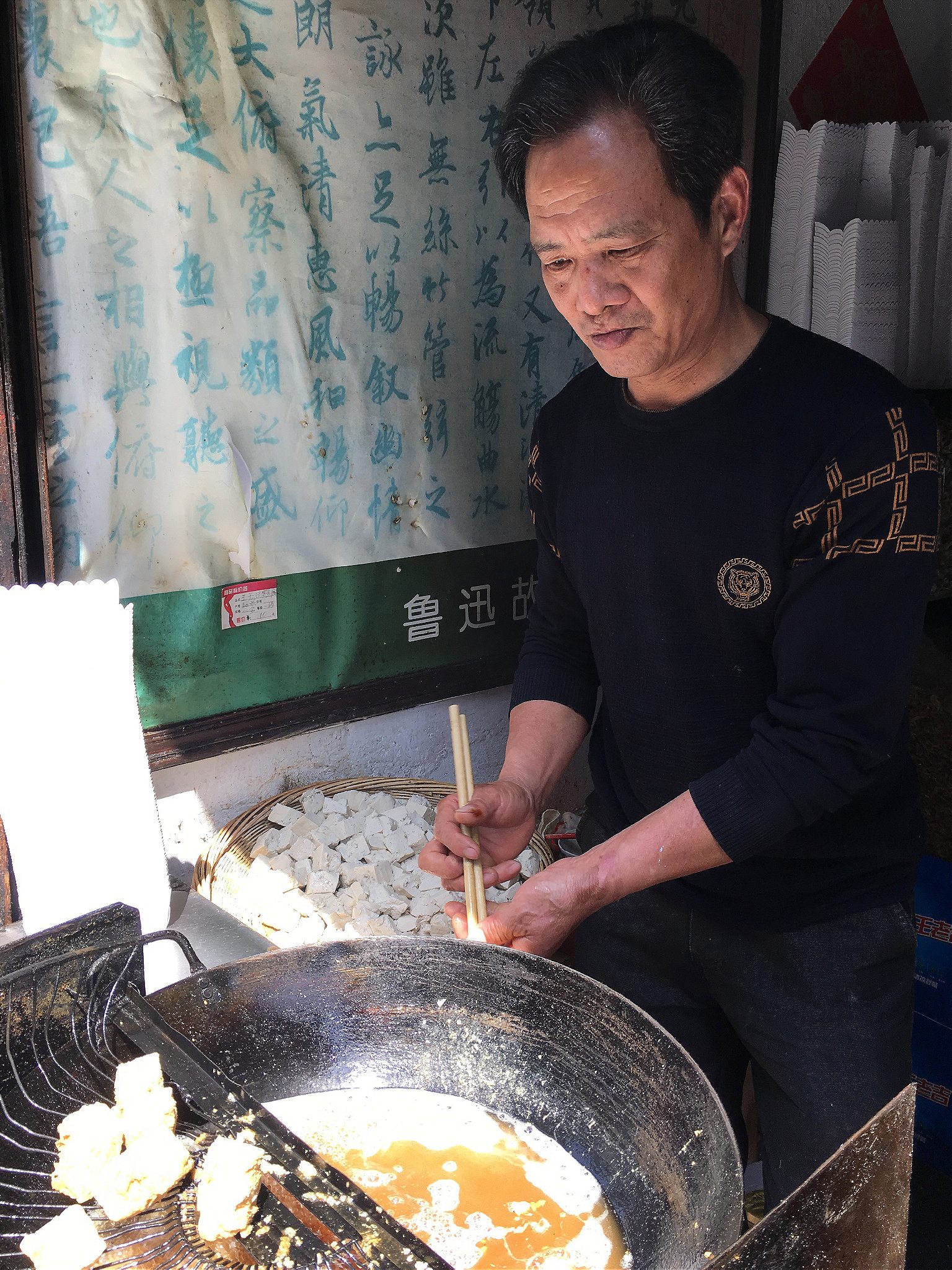
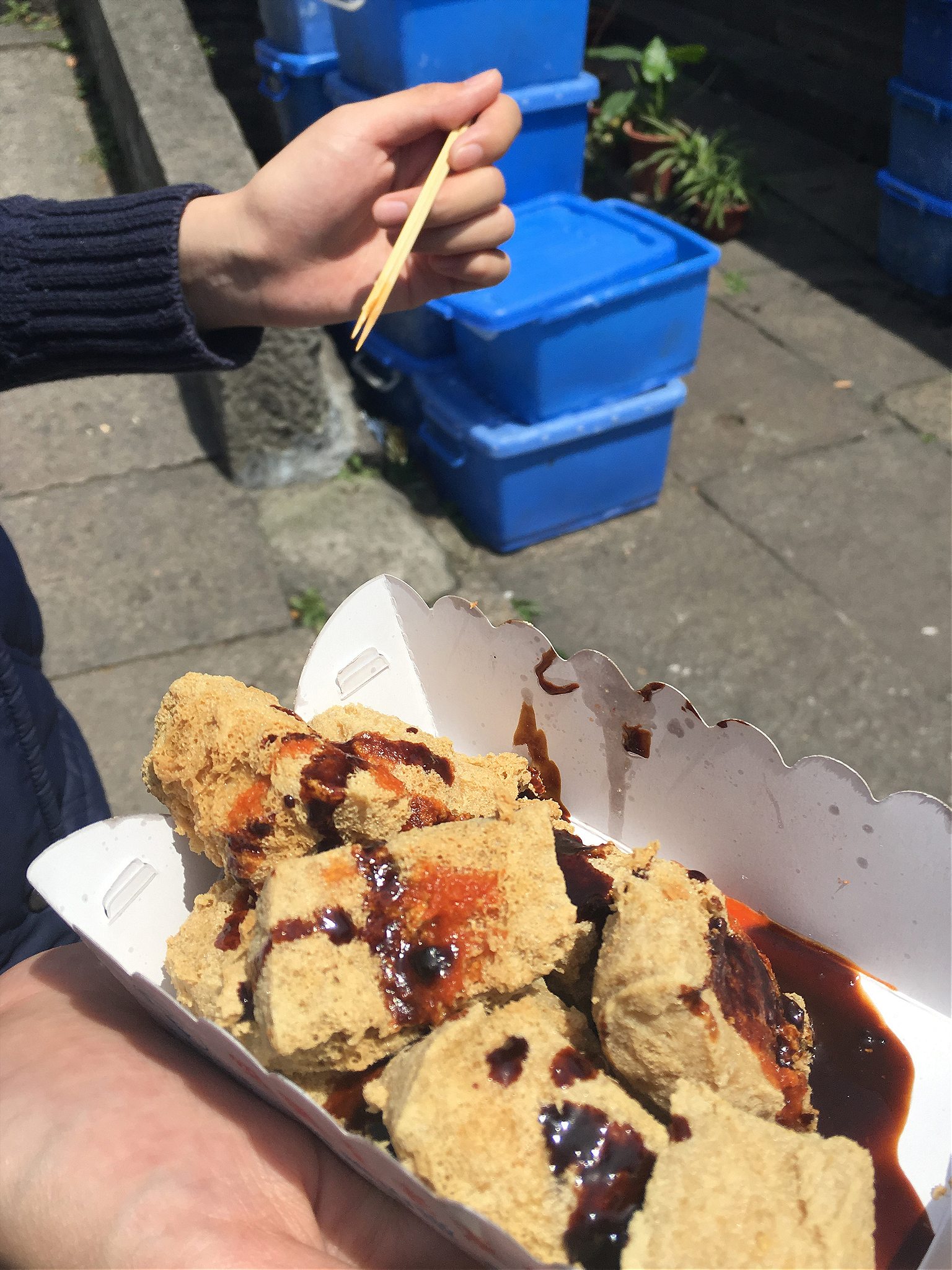
Zhao believes he was made a scapegoat to show that the authorities in Shaoxing were taking food safety seriously. He was a high-profile target due to the attention he had received from the food TV series. Other stinky tofu vendors in Shaoxing went to the local government office to protest the fine on his behalf, but then they, too, started to face harassment for lacking the same license. Not knowing what else to do, Zhao hired a lawyer and sued the inspection agency.
“The license was never seen in our industry,” he argued. “Nobody ever gets it. Since my fine, the chengguan have driven a lot of stinky tofu vendors away.”
As he talked about his legal troubles, a dark cloud passed over his face. It’s clear how much the case has weighed on him.
“My first lawyer lost my case. Now I have a second lawyer who says our scale of production is at best at the workshop level. The fine should be within RMB 30,000 to 50,000 (about $4,400-$7,300). The administration had never given me any notice or warning about this so-called illegal activity. They just fined me.”
His eyes filling with tears, he said that when his punishment made the news, many people online advised him to pay a bribe to make the problem go away. Instead, he decided to make his case to the public.
Keen to show me just how hygienic his chou doufu is, he took me into the kitchen where a batch of tofu cubes had been soaking in a plastic tub of amaranth brine since the morning. Without hesitation, he rolled up his sleeves and dipped his hands in the murky liquid to scoop out a handful and place in a basket. The liquid had the color of dirty dishwater, and when I leaned in, it definitely reeked like rotten vegetables in a drain. The cubes usually stay in the brine for several hours, Zhao explained, but it depends on a number of factors, including the quality of the tofu, the freshness of the brine, and the outside temperature. (October is the best month, he said, following the amaranth harvest.) He’s a tofu master by now; he knows the exact amount of time needed to produce the optimal stench—and do it safely. He has a secret ingredient, too: a dash of baijiu (Chinese grain alcohol) that is added to the brine just after the amaranth stalks have reached the perfect stage of putridness.
Zhao insisted I have a taste, handing me a container of piping-hot tofu that had just come out of the fryer. I’d had stinky tofu before, but his was a revelation. The funky odor mixed rather pleasantly with the residual taste of the cooking oil and the slightly sour, umami notes of the tofu. The outer layer had a rough, craggy appearance, but inside, the tofu was still soft—the perfect counterbalance. Before I realized it, I had eaten half the box.
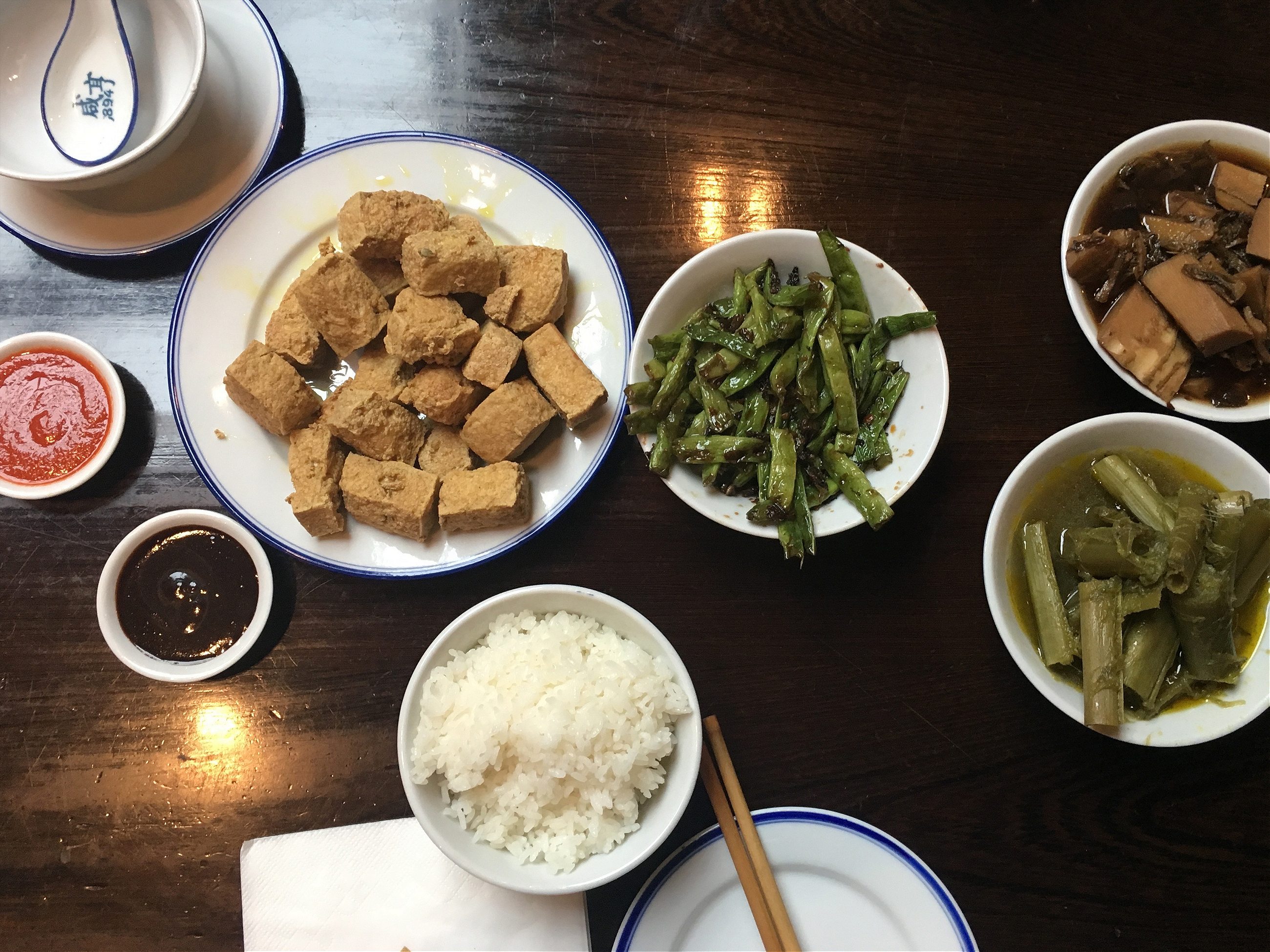
Across town, Mao Tianyao empathizes with Zhao’s plight. Mao is a longtime chef, Shaoxing food historian, and manager of the Xianheng Tavern. Opened in 1894, Xianheng Tavern was made famous as the setting for one of Lu Xun’s most popular short stories, “Kong Yiji,” about a scholar who fails the imperial exams and spends all his time drinking huangjiu (yellow rice wine) at the tavern. These days, it’s mobbed with tourists wanting the modern-day Lu Xun tourist experience—snacking on chou doufu in a charming ancient teahouse setting.
Mao keeps a watchful eye over the preparation of the Shaoxing specialties at his restaurant to ensure their authenticity and, of course, make sure his chefs are following the proper safety guidelines. The restaurant hasn’t had any issues with its own stinky tofu. “We have to ensure the quality is good,” Mao said. “It’s on every table.” When it comes to food safety, he believes the authorities are doing their best to clean up the stinky tofu industry, even training less-skilled vendors on the proper ways of fermentation. It’s a challenge, but the future of the delicacy depends on ensuring it’s made well—and safely.
“I don’t think people will intentionally add poisonous or hazardous additives to the brine because our food safety law is quite severe,” he said. But he acknowledges how difficult it is to police a freewheeling industry of small-scale producers like Zhao Baoxian.
“The issue of standardization is where Chinese cooking differs most from the West,” he said. “It’s the shortcoming of Chinese cooking—and its charm.”
Making matters even more difficult for stinky tofu vendors in Shaoxing is their lack of cohesion—they haven’t been able to organize and self-regulate their production methods to ward off trouble with the authorities. An effort had apparently been made by one proactive merchant to form a stinky tofu industry association in the mid-2000s, but the city’s fiercely independent operators refused, citing an unwillingness to share their secret recipes.
So, the community remains a freewheeling assembly of bit players today—one-man and -woman bands powerless to stand up to the government or effect change in policy. If they’re all put out of business someday, the only place left to indulge in this age-old delicacy will be on the menus of upscale restaurants like Xianheng, catering to tourists.
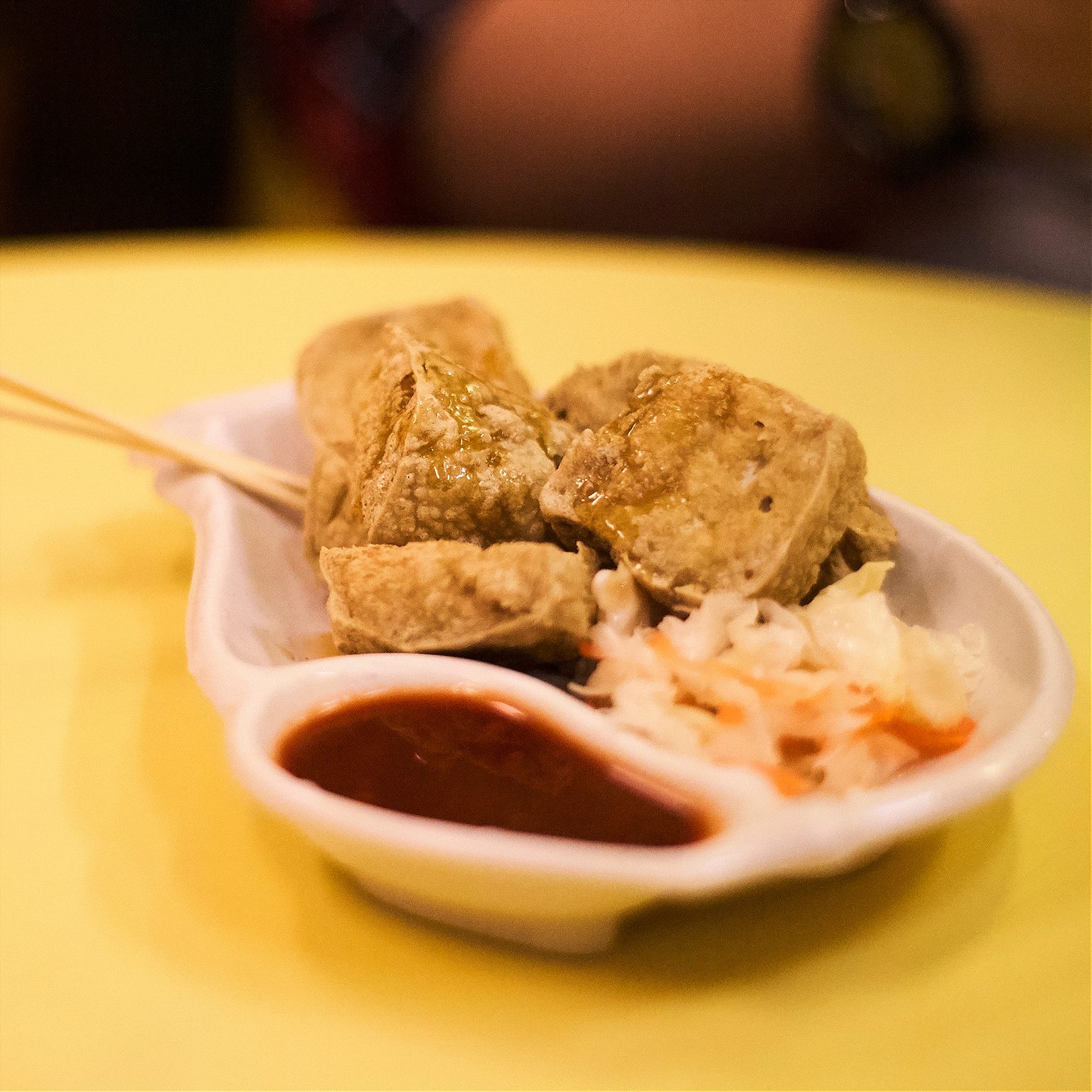
Fortunately for Zhao, the health authorities finally relented last year and agreed to reduce his fine. “They asked me how much money I was willing to pay. I said a thousand (RMB) or two is fair,” he said. The government wanted a bit more, so, last May, it froze Zhao’s Alipay account (similar to Apple Pay), containing RMB 30,000 (about $4,500). The case against him was then suspended, and Zhao dropped his lawsuit.
Since then, Zhao has tried to comply with the new food safety regulations by applying for the proper license—he went to the bureau twice last summer to apply, without success. Now that the case against him has been dropped, he’s afraid to go back and try again, believing it will bring new scrutiny of his business—and perhaps more trouble.
“Food inspectors only come when people apply for licenses or they get tips of food safety complaints,” he says. “Whenever senior government officials state the importance of food safety, the inspectors act upon it. In my case, this only happened once. It never happened before.”
He hasn’t had any complaints recently, either. In fact, his business is doing better than ever. “Even people from the court now buy my stinky tofu,” he says. “The head of the court wants it, too.”
With powerful people like this on his side, his worries may be behind him. But there’s still the bigger concern about the stinky tofu industry itself, and whether it can recover from the food safety crackdowns of recent years. “Shaoxing is the best place to get stinky tofu,” Zhao says. Sadly, however, there are fewer and fewer people making it.
Xi Shen contributed research to this report.






